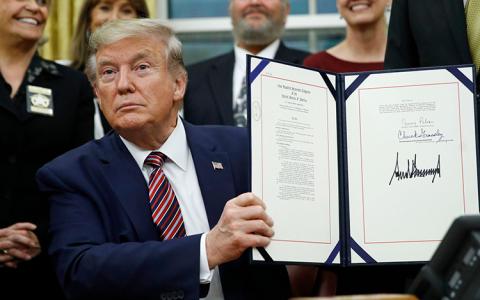
There is growing support within the Trump Administration to include another direct stimulus payment in the next stimulus bill. President Trump has indicated his support for another round of stimulus checks in several recent interviews. President Trump also stated he wants the next stimulus check to be larger than the previous one.
While there has been some pushback for another stimulus check in recent weeks, particularly among Republican leadership, it seems their position may gradually be changing. White House economic adviser Larry Kudlow indicated the next stimulus package would be large-scale and would “probably” include another stimulus check.
And yesterday, Treasury Secretary Steven Mnuchin stated during a press conference that the White House is going to "seriously consider" another round of cash payments. This comes just over a week after Mnuchin stated the next stimulus bill would be jobs focused and may not include a stimulus payment.
This changing sentiment comes at a time when the coronavirus infection numbers are growing at a rapid pace and several states have rolled back their reopening plans. Increased restrictions may lead to further layoffs and economic pain, increasing the need for another stimulus package sooner, rather than later.
What Will the Next Stimulus Package Include?
The $2 trillion CARES Act was largely successful, however, many people and industries are still struggling. The next stimulus package will be designed to help improve employment, help businesses, and possibly give another round of direct payments in the form of a stimulus check.
There is also support for possible payroll tax cuts, infrastructure spending, business liability protection, and even a tax credit for domestic travel.
Employment Numbers Will Have a Major Impact on the Next Stimulus Package
Employment numbers will be one of the major factors that determine whether or not there will another direct stimulus payment or extended unemployment benefits.
The CARES Act includes a $600 weekly unemployment bonus paid by the federal government, in addition to state unemployment benefits. This bonus payment is scheduled to end on July 31. Congress is split on what to do about this going forward.
The House passed the HEROES Act which would extend the $600 weekly payments. However, the HEROES Act is unlikely to be passed in its current form.
Many Republicans, however, believe the $600 weekly benefit is too generous as some workers are earning more money from unemployment benefits than they earned while working.
The American Workforce Rescue Act, proposed this week by Senate Democrats, may offer a middle ground by offering enhanced unemployment benefits that taper off as the unemployment rates drop in the recipient’s state.
Where Do We Currently Stand with Employment?
The recent jobs numbers were better than expected and show the economy is making a comeback. However, this doesn’t tell the full story, as it comes at a time when many states are reversing their reopening plans. The next few weeks will be critical in determining how large the next stimulus package will be and what it will include.
Other Factors That Will Impact The Next Stimulus Package
Government leaders are also considering other factors, such as the total cost of the next stimulus package, economic growth, and of course, the upcoming November elections.
The $2 trillion CARES Act is currently the largest recovery bill passed in U.S. history. The HEROES Act, passed by the House, calls for $3 trillion in aid, including a $1,200 stimulus check for individuals and up to $6,000 per family.
The Republican-led Senate considers it a Democratic “wish-list” and Senate Majority Leader Mitch McConnell declared it “dead on arrival” in the Senate. This bill is unlikely to be passed.
There were several other stimulus check proposals that never made it far due to their cost, several of which far exceeded the $3 trillion price tag of the HEROES Act.
Economic growth will be largely tied to the spending power of the American public, as well as any government-led initiatives, such as infrastructure spending.
Finally, we would be remiss not to mention the upcoming general election. Many political leaders will need to strike the right balance between getting the economy on the right track without alienating their voting base.
This article originally appeared on Forbes.



